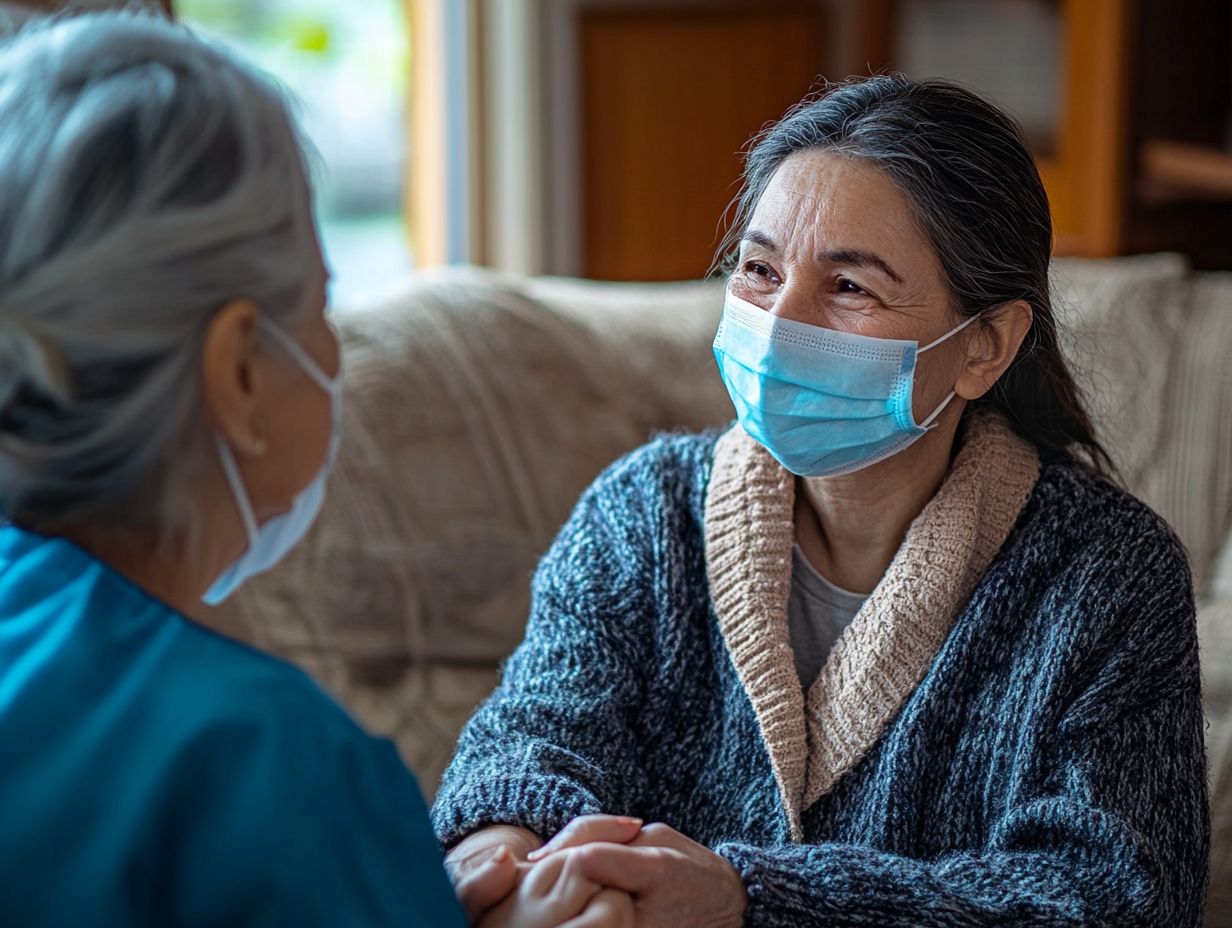Caregivers play an essential role in the treatment journey, offering invaluable support, healthcare advocacy, and compassionate care for individuals with chronic illnesses. By ensuring continuity of care and maintaining open communication with healthcare providers, caregivers significantly enhance treatment outcomes and the overall caregiving journey.
Their responsibilities encompass a range of tasks, from daily assistance and healthcare coordination to emotional support and compassionate support, which are crucial for managing patient needs effectively and maintaining the quality of life in different stages of caregiving.
Various types of caregivers, including family caregivers, professional caregivers, and volunteers, contribute uniquely based on their roles and expertise. Despite the critical support they provide, caregivers face numerous challenges, such as caregiver exhaustion and emotional stress, necessitating resilience and community backing.
To combat these challenges, caregivers are advised to adopt stress management techniques, utilize community resources, and engage in self-care strategies to maintain their well-being and mental health.
Utilizing support services such as respite care, caregiver support groups, and community services enables caregivers to sustain their caregiving without compromising their health, thus promoting caregiver well-being and self-renewal.
Key Takeaways:
The Importance of Caregivers in Treatment

Caregivers are crucial in treatment by providing support, advocacy, and ensuring continuity of care for individuals with chronic illnesses.
Caregivers enhance treatment outcomes by maintaining communication with healthcare providers and managing daily care tasks.
The role of caregivers is vital for both emotional support, healthcare advocacy, and practical management of healthcare needs, enhancing the caregiving experience.
The Role of Caregivers in Supporting Patients
Caregivers support patients by providing emotional support, daily assistance, and healthcare coordination.
The caregiver role involves communicating with healthcare professionals, managing patient needs, and alleviating patient stress through emotional connections and compassionate support.
Caregivers face challenges like schedule management, caregiver fatigue, and emotional distress, requiring resilience, family dynamics understanding, and community support.
Types of Caregivers
Types of caregivers include:
- Family caregivers who provide unpaid care to relatives or friends.
- Professional caregivers offering paid services in settings like nursing homes or assisted living.
- Volunteer caregivers who support through community programs.
- Live-in caregivers residing with care recipients for continuous assistance.
Family Members, Friends, and Professional Caregivers
Family members and friends often serve as family caregivers, providing emotional support and assistance based on personal experience. Professional caregivers, however, offer specialized training and expertise in caregiving.
Family caregivers balance caregiving responsibilities with other commitments, which can lead to stress. Professional caregivers focus on delivering structured care, ensuring care recipients receive proper medical attention and companionship.
Both types of caregivers play crucial roles in the caregiving journey but face unique challenges, such as caregiver burnout and emotional distress, impacting their effectiveness and personal satisfaction.
Challenges Faced by Caregivers

Caregivers face challenges such as exhaustion, caregiver burnout, emotional distress, and physical health issues due to the demands of caring for loved ones with chronic illnesses or aging parents.
Emotional and Physical Demands
Caregivers face emotional and physical demands that can lead to caregiver exhaustion, affecting both mental well-being and caregiving quality.
Emotional demands include loneliness and anxiety, while physical demands result in fatigue.
Caregivers should adopt stress management strategies and therapeutic activities, such as:
- Setting aside personal time
- Practicing mindfulness
- Joining support groups
Maintaining a healthy diet and regular physical activity helps create a sustainable caregiving environment, promoting caregiver well-being and preventing health risks.
Support for Caregivers
Support for caregivers includes community resources, respite care options, and caregiver education programs designed to assist caregivers in managing responsibilities, improving skills, and fostering caregiver support.
Support helps caregivers access relief and build emotional resilience.
Resources and Services Available
Caregivers have access to resources and services like respite care, support groups, and family assessments to support their caregiving roles and enhance family relationships.
Community resources provide volunteer programs for temporary assistance, allowing caregivers to take breaks.
Support groups help caregivers connect, share experiences, and gain emotional support.
Healthcare professionals conduct family assessments to identify caregiver challenges and create individualized support plans.
Tips for Caregivers

Caregivers can maintain well-being by scheduling regular breaks, seeking support from caregiver support groups, and practicing stress-relief techniques like meditation and other therapeutic activities.
Professional help, proper nutrition, and adequate sleep enhance resilience in caregiving, contributing to caregiver well-being and mental health.
Time management and clear communication with the healthcare team ensure efficient caregiving and improve family dynamics.
Self-Care and Coping Strategies
Self-care strategies and coping mechanisms are methods caregivers use to maintain well-being and prevent caregiver burnout.
Effective self-care includes establishing a structured routine with regular breaks to recharge.
Engaging in activities like meditation, yoga, and breathing exercises can reduce stress.
Hobbies and social interactions help caregivers reconnect with personal interests and build a support network.
Implementing these strategies improves caregiver health and enhances caregiving quality.
Frequently Asked Questions
What is the role of caregivers in a treatment journey?
The role of caregivers in a treatment journey is to provide emotional, physical, and practical support to the person receiving treatment. They play a crucial role in helping the person cope with their chronic illness or condition and navigate through their treatment plan effectively.
How can caregivers support their loved ones during their treatment journey?

Caregivers can support their loved ones by attending appointments with them, helping with medication management, and providing emotional support. They can also assist with household tasks and errands to alleviate the burden on the person receiving treatment.
What challenges do caregivers face in a treatment journey?
Caregivers may face challenges such as balancing their own needs with the needs of their loved one, managing their own emotions, and dealing with the stress and uncertainty of the treatment journey. They may also face financial and logistical challenges.
How can caregivers take care of themselves while supporting their loved ones in a treatment journey?
It is important for caregivers to prioritize self-care and seek support from others. This can include taking breaks, practicing relaxation techniques, and seeking help from support groups or counseling services.
What resources are available to help caregivers in a treatment journey?
There are many resources available to help caregivers, including support groups, respite care services, and caregiver education programs. Caregivers can also consult with their loved one’s healthcare team for guidance and resources.
What can caregivers do to promote a positive treatment journey for their loved ones?
Caregivers can promote a positive treatment journey by maintaining open communication with their loved one and their healthcare team, staying organized and informed about the treatment plan, and providing emotional support and encouragement throughout the journey.





